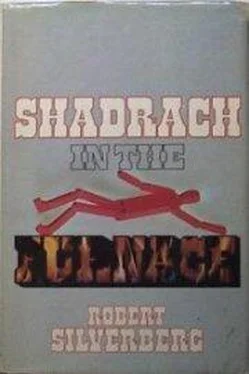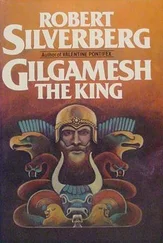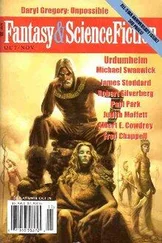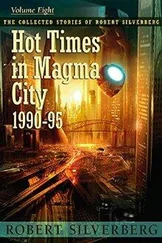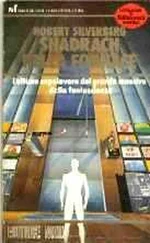Philadelphia vanishes from the screen and is replaced by an idyllic tropical scene, pink-white half-moon beach, feathery palm fronds, flowering hibiscus in scarlet and yellow, no people in view. Mordecai shrugs and moves on.
The imperial chambers are circular in layout, occupying the entire top story of the Grand Tower of the Khan except for the five wedge-shaped apartments, such as the one where Mordecai lives, that notch into the suite equidistantly around its rim. As the doctor crosses Surveillance Vector One he comes to three massive doorways, spaced some eight meters apart along the side of the room farthest from the interface through which he entered. The left-hand doorway leads to the bedroom of Genghis Mao, but Mordecai does not take it — best to let the Chairman have all the sleep he needs, today — nor does he choose the central doorway, which goes to the Chairman’s private office. Instead he approaches the right-hand doorway, the one that opens into the room known as Committee Vector One, through which he must pass to reach his own office.
He waits briefly while the door scans and approves him. All the inner rooms of the imperial suite are divided one from another by such impermeable barriers, smaller in scope than the main doors at the five interfaces but similarly suspicious: no one is allowed to range freely here from room to room. After a moment the door grants him entry to Committee Vector One. This is a large, brightly lit room, spherical like all the major rooms of Genghis Mao’s suite. It occupies the physical center of the apartment, the locus around which all else turns, and in a less literal sense it is the nerve center of the planetary governing structure, the Permanent Revolutionary Committee. Here, day and night, arrive urgent communiques from Committee cadres in every city; and here, day and night. Committee potentates sit in front of intricate switchboards glistening with terminals, making policy and communicating it to the lesser satraps in the outer provinces. All applications for Roncevic Antidote treatments are routed through this room; all requests for organ transplants, regeneration therapy, and other vital medical services are considered in Committee Vector One; all jurisdictional disputes within the regional Committee leadership are settled here according to the principles of centripetal depolarization, Genghis Mao’s chief philosophical gift to humanity. Shadrach Mordecai is not a political man and he has little concern with the events that take place in Committee Vector One, but since the floor plan of the building requires him to cross the room many times a day, he does occasionally pause to observe the bureaucrats at their labors, the way he might stop to examine the behavior of bizarre insects in a crumbling log.
Not much seems to be going on here now. At times of high crisis all twelve of the switchboard seats are occupied, and Genghis Mao himself, seated at his own elaborate desk at the very center of everything, fiercely manipulating his formidable battery of sophisticated communications devices, directs the course of strategy. But these are quiet days. The only conspicuous crisis in the world is the one in the Chairman’s liver, and that will soon be remedied. For weeks now Genghis Mao has not bothered to take up his post in Committee Vector One, preferring to discharge his sovereign responsibilities from his smaller private office adjoining his bedroom. And only three of the switch-boards are in use this morning, operated by weary-looking vice-chairmen, one male and two female, who yawn and slouch as they take incoming messages and formulate appropriate replies.
Mordecai is halfway across the room and walking briskly when someone calls his name. He turns and sees Mangu, the heir-apparent to Genghis Mao, heading toward him from the direction of the Chairman’s private office.
“Do they operate on the Khan today?” Mangu asks worriedly. Mordecai says, nodding, “In about three hours.”
Mangu frowns. He is a sleek, handsome young Mongol, unusually tall for his kind, nearly as tall as Mordecai himself.
His face is round; his features are symmetrical and pleasing; his eyes are bright and alert. At the moment he seems tense, jangled,
“Will it go well, Shadrach? Are there any risks?”
“Don’t worry. You won’t become Khan today. It’s only a liver transplant, after all.”
“Only!”
“Genghis Mao’s had plenty of those.”
“But how much more surgery can he stand? Genghis Mao is an old man.”
“Better not let him hear you say that!”
“He’s probably listening right this minute,” says Mangu casually. Some of the tension goes from him. He grins. “The Khan never takes what I say seriously, anyway. I believe he sometimes thinks I’m a bit of a fool.”
Mordecai smiles guardedly. He also sometimes thinks Mangu is a bit of a fool, and perhaps more than a bit. He remembers Dr. Crowfoot of Project Avatar, Nikki Crowfoot, his Nikki with whom he would have spent this past night but for Genghis Mao’s operation, telling him months ago of the dismal fate reserved for Mangu. Mordecai knows, as Mangu almost certainly does not, that Genghis Mao plans to be his own successor, through the vehicle of Mangu’s strong, healthy young body. If Project Avatar is carried to a successful conclusion, and the auguries are favorable for it, the fine sturdy figure of Mangu will indeed someday sit upon the throne of Genghis Mao, but Mangu himself won’t be there to enjoy the occasion. To Mordecai, anyone who marches as blithely toward his own destruction as Mangu is doing, perceiving nothing, suspecting nothing, fearing nothing, is a fool and worse than a fool.
“Where will you be during the operation?” Mordecai asks.
Mangu gestures broadly toward the main command desk of Committee Vector One. “Over there, pretending to run the show.”
“Pretending?”
“You know there are many things I still have to learn, Shadrach. I’m not going to be ready to take over for years. That’s why I wish he wouldn’t undergo all these transplants.”
“He doesn’t do it for the exercise,” Mordecai says. “The present liver’s been failing for weeks. It’s got to come out. But I tell you: don’t worry.”
Mangu smiles and grips Mordecai’s forearm for a brief, affectionate, surprisingly painful squeeze. “I won’t. I have faith in you, Shadrach. In the whole medical team that keeps the Khan alive. Let me know the moment it’s over, will you?”
He strides away, toward the main command post, to play at being monarch of the world.
Mordecai shakes his head. Mangu is an attractive figure, genial and charming and even charismatic. In a dark time lit only by ghastly jagged flashes of nightmare-light, Mangu is something of a popular hero. In the past ten months or so he has become the Chairman’s public surrogate, appearing in Genghis Mao’s place at formal functions, dam dedications, Committee congresses and the like, and the dashing, gallant prince-in-waiting, so disarming, so unpretentious, so accessible to the populace, is beloved in a way that Genghis Mao never has been, never for an instant. Those who have observed Mangu at close range are aware that he is essentially a hollow man, all image and no substance, shallow and plump-souled, an amiable athlete living an implausible charade; but though Mangu is trivial, he is far from contemptible, and Mordecai feels genuine compassion for him. Poor Mangu, fretting over the possibility that he might succeed the Khan this day, with his apprenticeship not yet finished! Does it ever occur to Mangu that he will never — not in a year, not in ten years, not in a thousands — be a fit successor to Genghis Mao, that he is fundamentally incapable of wielding the terrible power which he is ostensibly being groomed to inherit? Apparently not. Or else Mangu, knowing his own limits, would gave begun to wonder what plan Genghis Mao really had for him, why the Chairman had picked as his successor a mere handsome boy, his own opposite in all important respects. To train him to be supreme sovereign? No. No. To be a puppet, merely; to dance before the people and win their love. And then, one day, to have his identity scooped out and thrown away, so that his body might become a dwelling for the wily mind and dark soul of Genghis Mao, when the Chairman’s own ancient patched hull can no longer be repaired. Poor Mangu. Mordecai shivers. He hurries on into his own office, closes the door, seals it.
Читать дальше
